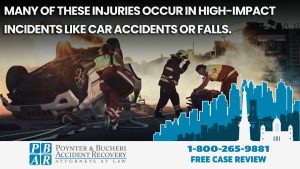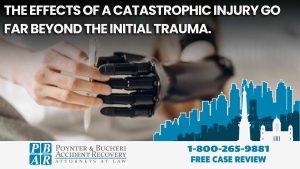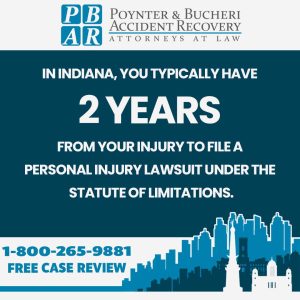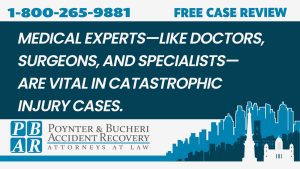
Suffering a catastrophic injury can turn your world upside down. Suddenly, everyday tasks become difficult, work may no longer be possible, and your future uncertain. In a busy city like Indianapolis, where auto accidents and other serious incidents happen daily, finding a law office that truly understands your challenges is important.
That’s where Poynter & Bucheri comes in. Recognized among the best law firms in Indiana, our experienced Indianapolis catastrophic injury attorneys are here to help you navigate personal injury laws, fight for the compensation you deserve, and take some of the weight off your shoulders—so you can focus on healing and rebuilding your life. Contact us at 800-265-9881.
What is Considered a Catastrophic Injury?

A catastrophic injury is a severe, life-changing injury that results in long-term or permanent disability, disfigurement, or loss of function. Unlike typical injuries, these drastically impact a person’s ability to live a normal life.
While there’s no single legal definition for what is considered catastrophic, injuries often involve serious damage to the brain or spinal cord—such as traumatic brain injuries (TBIs), paralysis, amputations, severe burns, or fractures that require lifelong medical care. Many of these injuries occur in high-impact incidents like car accidents or falls.
What makes an injury “catastrophic” is its lasting repercussions. Victims and their families often face emotional, physical, and financial challenges that reshape everyday life.
You may have a valid claim if you or a loved one has been catastrophically injured and believe someone else may be at fault. A personal injury case handled by an experienced catastrophic injury lawyer can help you pursue the appropriate compensation you need to move forward.
Catastrophic Spinal Cord Injuries That Result in Paralysis
Catastrophic spinal injuries often result in permanent loss of mobility and independence. If paralysis occurs, speaking with an experienced Indianapolis attorney can help you understand your legal options and next steps.
Two Types of Paralysis
There are two main categories of paralysis:
- Paraplegia – Paralysis affecting the lower half of the body. Paraplegia typically results from injuries to the thoracic, lumbar, or sacral spine.
- Quadriplegia (or Tetraplegia) – Paralysis affecting all four limbs and the torso, usually caused by severe injury to the cervical spine. This condition can impact breathing, bladder and bowel control, and arm and hand function.
Paralysis can also be classified by how much of the body is affected:
- Localized Paralysis – Limited to one body area, such as a single limb or muscle group.
- Generalized Paralysis – More widespread, affecting multiple areas or the entire body.
Symptoms of Paralysis
Symptoms vary depending on the severity and location of the suffered injuries but may include:
- Loss of muscle control and function
- Muscle atrophy
- Stiffness, spasms, or involuntary twitching
- Numbness, tingling, or nerve pain
- Difficulty breathing or chest tightness
- Loss of bladder or bowel control
- Impaired mobility in the limbs or trunk
- Sexual dysfunction
These symptoms can appear suddenly or worsen over time.
If you or a loved one is living with paralysis caused by someone else’s negligence, you may have the right to pursue compensation. An experienced Indianapolis personal injury lawyer can help you seek the justice and financial recovery you deserve.
Long-Term Consequences to the Victim of a Catastrophic Injury

The effects of a catastrophic injury go far beyond the initial trauma. The long-term physical, emotional, and financial fallout from such injuries can last a lifetime.
Physical Challenges
Victims of catastrophic injuries often face permanent physical limitations, losing mobility, sensation, or the ability to manage daily tasks without help. Many victims require long-term therapy to relearn basic skills or adjust to a new way of living.
Mental Health Impacts
Catastrophic injuries profoundly impact mental health. Survivors often face depression, anxiety, or PTSD, especially as they cope with the loss of independence or significant life changes. The trauma and ongoing challenges can take a serious emotional toll.
Financial Consequences
The financial burdens of a catastrophic injury are staggering. In addition to the immediate costs of emergency care and medical bills, victims may face a lifetime of extensive medical treatment, including:
- Surgeries
- Rehabilitation
- Medical equipment
- Home modifications
- In-home care services
Income loss is another major concern after a catastrophic injury, often placing significant financial strain on both the victim and their family—especially when returning to work is no longer an option.
Partnering with the catastrophic injury lawyers at Poynter & Bucheri can help you pursue the financial recovery you deserve while holding the liable party accountable.
How the Victim’s Families Are Impacted After a Catastrophic Injury

When someone suffers a catastrophic injury, the effects extend well beyond the victim. While the injured person faces physical pain and emotional distress from suffered damages, their loved ones are often put into unfamiliar and demanding roles—caregiver, medical advocate, financial planner, and emotional support.
The toll can be overwhelming. Family members may experience anxiety, depression, PTSD, social isolation, and even burnout or thoughts of self-harm. Physically, caregiving can lead to chronic fatigue and health issues, especially when caregivers neglect their own needs.
In many cases, the accident victim is unable to return to work, forcing family members to reduce hours or leave their jobs to provide care, adding significant financial strain. Even seemingly minor expenses, like home or vehicle modifications, can quickly accumulate and impact a family’s long-term financial stability.
Lost Wages From a Catastrophic Injury
Lost wages are one of a catastrophic injury’s most financially devastating effects. Recovering these losses requires solid documentation—especially if you’re self-employed.
Working with an experienced Indianapolis personal injury lawyer can strengthen your personal injury claim and help you obtain the compensation you deserve. In extreme negligence cases, your legal team may also seek punitive damages.
Documenting and Calculating
To seek financial compensation for lost income, you must prove how much you’ve lost and how long your earning ability has been affected. This includes:
- Pay stubs and tax returns
- A letter from your employer
- Medical records
- Expert testimony
If your injury is permanent or long-term, you may also be entitled to compensation for loss of future earning potential, not just the wages you’ve already missed. Working with experienced trial lawyers can make all the difference in presenting the right evidence.
Why the Claims Process is More Complicated if You Are Self-Employed
Self-employed accident victims face unique challenges in proving lost wages. Unlike traditional employees, you might not have regular paychecks or a set schedule to reference. Instead, you’ll need to rely on:
- Tax returns, 1099s, and business records
- Invoices, contracts, and client correspondence
- Profit and loss statements
Additionally, your claim may require more subjective analysis, such as estimating what new clients or projects you likely would have secured if you hadn’t been injured. Working with experienced trial lawyers can strengthen your personal injury claim and maximize your payout.
Things You Should Not Do After a Catastrophic Injury

A catastrophic injury is life-changing, and what you don’t do afterward can be just as important as what you do. Missteps can jeopardize your legal rights and financial compensation. Here’s what to avoid:
Don’t Talk to Reporters or the Press
If your accident garners public attention, do not speak to reporters about your injuries, what happened, or who may be at fault. Anything you say can be taken out of context and used against you later. Always refer media inquiries to your personal injury attorney.
Don’t Contact or Confront the At-Fault Party
Even if emotions are running high, avoid contacting negligent parties. Confrontations can worsen things and may result in statements that could damage your legal case. All communication should go through your personal injury attorney.
Don’t Apologize or Admit Fault
Even phrases like “I’m sorry” can be misinterpreted as an admission of liability. Instead of commenting on the incident, focus on gathering the necessary documentation and let your personal injury attorney guide all communication.
Don’t Delay Medical Treatment
Some severe injuries—like brain trauma or internal bleeding—may not show immediate symptoms. Delaying medical attention not only puts your health at risk but may also be used by insurance companies to argue that your injuries aren’t as severe or weren’t caused by the accident.
Don’t Post on Social Media
Avoid posting anything about the accident or your recovery on platforms like Facebook, Instagram, or TikTok. Even innocent updates can be twisted to suggest you’re not as injured as you claim.
Don’t Accept a Quick Settlement Offer
After a catastrophic injury, insurance companies may push a fast settlement that doesn’t come close to covering expenses. Don’t accept anything without speaking to an Indianapolis catastrophic injury attorney and knowing your legal options.

Don’t Miss the Statute of Limitations in Indiana
In Indiana, you typically have two years from your injury to file a personal injury lawsuit under the statute of limitations (Indiana Code § 34-11-2-4). If you miss this deadline, you may lose your right to pursue legal action—no matter how strong your personal injury case is.
There are rare exceptions (such as for minors or cases involving government entities). It’s crucial to consult a catastrophic injury lawyer who understands the legal process immediately to ensure you don’t run out of time.
Types of Expert Testimony You Need in a Catastrophic Injury Case
Depending on the facts of your personal injury case, your trial lawyers may bring several experts to testify. These professionals work closely with your trial lawyers to explain complex details and support your case.
Medical Experts
Medical experts—like doctors, surgeons, and specialists—are vital in catastrophic injury cases. They explain the severity of the injuries, necessary treatments, long-term effects, and future medical needs. Their testimony helps jurors grasp the full scope of the victim’s medical journey and lasting impact.

Accident Reconstruction Experts
Reconstruction experts use science and engineering to determine how an accident occurred, especially when the fault is disputed. Analyzing evidence like vehicle damage, road conditions, and witness accounts helps clarify liability in car accidents or falls.
Vocational Experts
Vocational experts assess how an injury impacts a person’s ability to work, including whether they can return to their job, need retraining, or are unable to work. Their testimony is key in proving loss of earning capacity and supporting claims for long-term income loss.
Economic Experts
An economic expert helps quantify the full financial impact of a catastrophic injury by calculating past and future medical costs, lost income, home modifications, in-home care, and other long-term expenses. Their analysis ensures that all future needs are considered when determining fair compensation.
Psychological or Mental Health Experts
In cases involving emotional trauma, depression, PTSD, or loss of enjoyment of life, mental health professionals can provide compelling testimony. They help jurors understand the invisible toll of catastrophic injuries on the victim’s mental well-being, their relationships, and quality of life.
A respected law office like Poynter & Bucheri will identify the expert testimony needed to strengthen your case and help you seek compensation that fully reflects the extent of your losses.
How Long it Generally Takes To Settle a Catastrophic Injury Case

There’s no set timeline for settling a catastrophic injury claim in Indiana. Some personal injury claims resolve in months, while others take a year or more. Often, victims must reach maximum medical improvement (MMI) before damages can be fully calculated, which may take months or longer.
Factors like disputed liability, multiple parties, or the need for expert witnesses can extend the process. Insurance companies may delay or offer low settlements, making legal negotiations or a trial necessary. This is where experienced trial lawyers can make a difference, using their knowledge of Indiana law to advocate for your best interests.
In cases involving gross negligence or intentional misconduct, pursuing punitive damages can add further complexity and length to the case but may significantly increase the compensation you’re entitled to. Partnering with a trusted law office for legal representation ensures that the process is handled efficiently and strategically.
Let Us Help You With Your Catastrophic Injury Case
If you or a loved one has suffered a catastrophic injury due to someone else’s negligence, getting the right legal support is essential. At Poynter & Bucheri, our qualified attorneys have a proven track record of success across various personal injury practice areas. We understand the toll these injuries take and are committed to holding the responsible party accountable.
Recognized among the best law firms in Indiana, our team of Indianapolis catastrophic injury attorneys provide skilled legal representation focused on recovering damages. Call 800-265-9881, or click here for a free consultation today.
